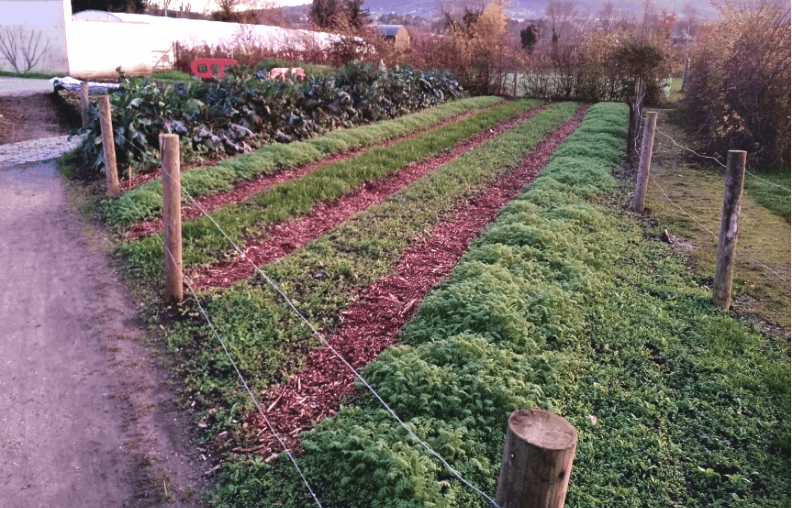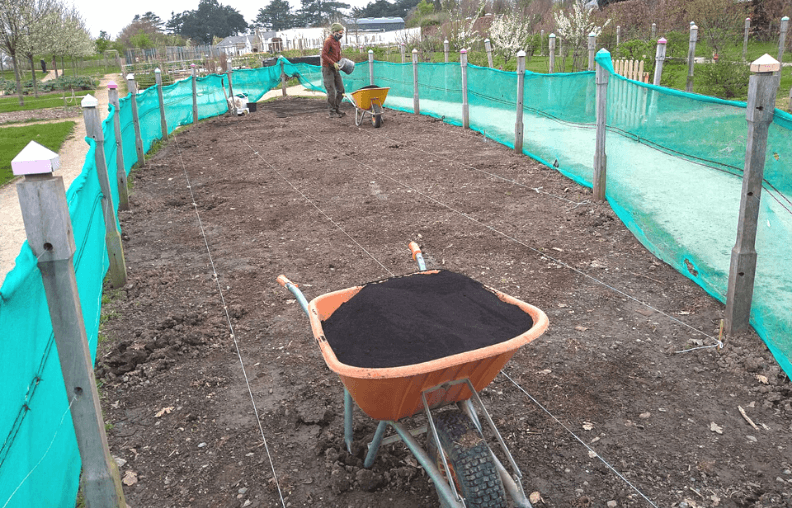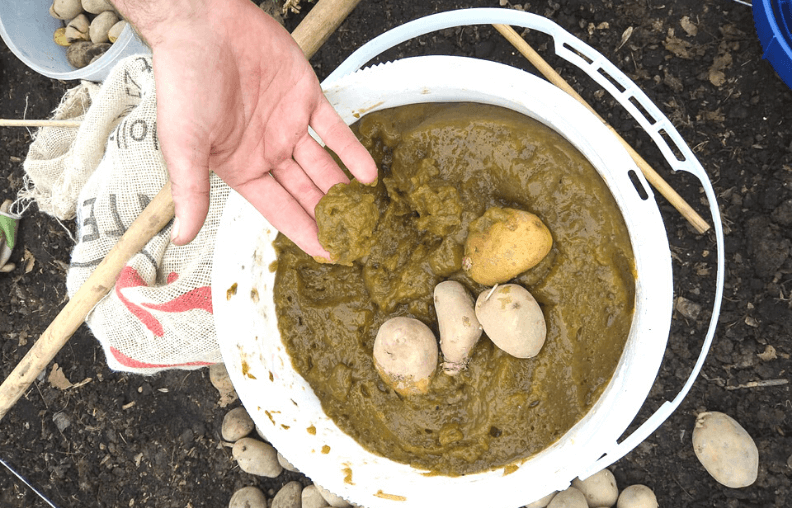Home » Regenerative Soil Practices

Regenerative Soil Practices
-
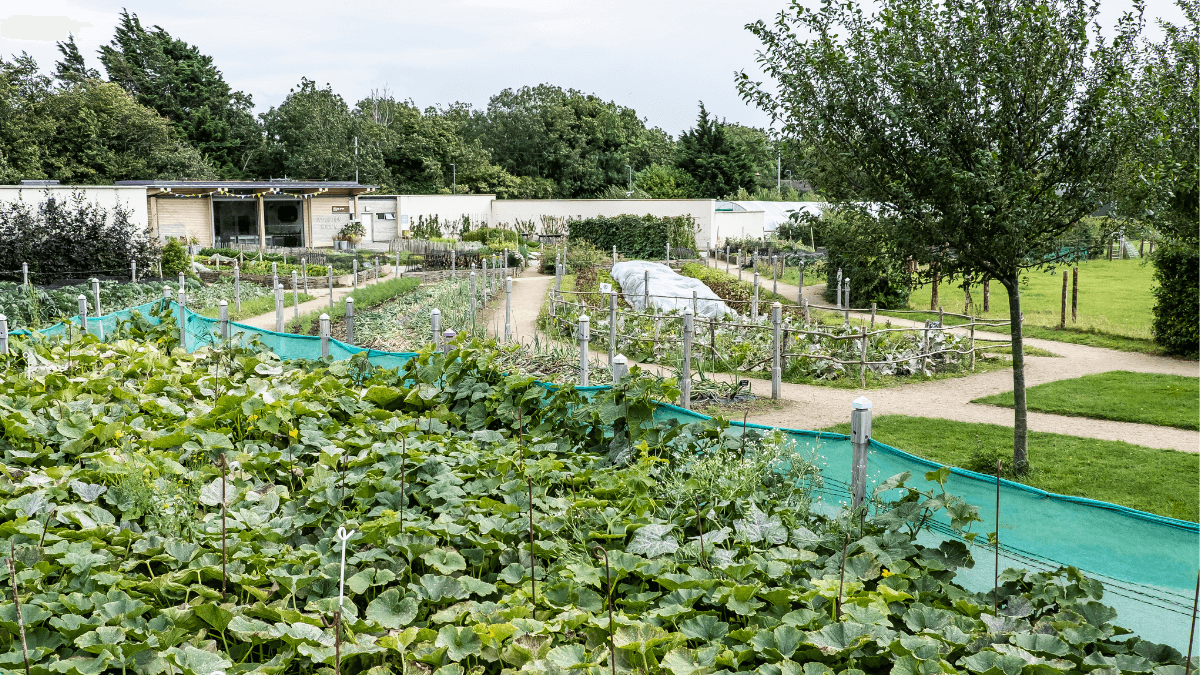
Colm O'Driscoll, Head Gardener at Airfield Estate shares his experience of growing regeneratively and organically.
International earth day falls on the 22nd of April this year and serves as a timely reminder to assess and refocus our efforts in the gardens to ensure we are doing everything possible to support a healthy environment. In 2016 the food gardens in Airfield entered organic certification while the rest of the garden areas in the estate have been managed organically and regeneratively since 2018.
The flurry of growth in the garden in spring can sometimes be overwhelming. Managing 8 acres of gardens organically can be very testing in Mid-Spring as weed growth threatens to consume the progress made earlier in the season. This led to a recent discussion in the gardens about a large area that is planted solely with ornamental grasses. An application of a selective herbicide in this area would no doubt ease the weed pressure and save precious time. On one level this temporary reprieve from weeding would be welcomed. Eradicating weeds by chemical means is a considerably less labour intensive and time-consuming option. However, there are other costs to consider when applying chemicals to our environment.
The global approach to horticulture has primarily been chemically orientated in recent history. The use of herbicides and pesticides in an output focused system has resulted in increased yields and production but often at the expense of the wider environment and soil health. The negative impact of this approach is apparent as soil erosion and degradation increase exponentially around the globe.
Airfield’s adoption of organic horticultural practices has undoubtedly improved the health of the wider environment on the estate. Five years have passed since the last application of any form of pesticide. This has enabled a healthy & balanced ecosystem to develop whereby pests are managed by natural predators. As we continually strive for improvements, we have married our organic horticultural practices with regenerative horticultural practices.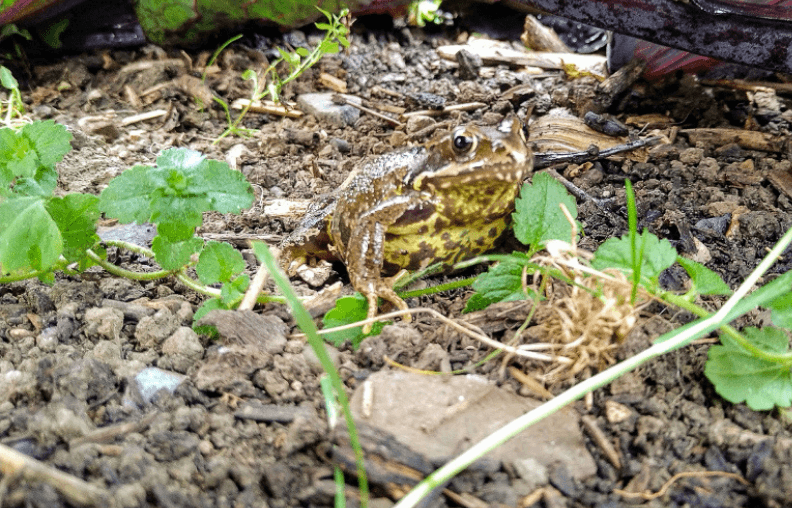
Frogs are a common sight in the gardens keeping slugs and snails under control A keystone principle of regenerative horticulture is that plants can form a symbiotic relationship with soil microbes. Plants release exudates from their roots on which the soil microbes feed. In return, the soil microbes supply the plants with essential nutrients enabling healthy plant growth. This relationship is destroyed when we apply artificial fertilizers to the soil. Plants stop producing root exudates and instead absorb the freely available artificial fertilizer. The destruction of the natural relationship between plant roots and the soil microbes, in turn, renders the plant reliant on the future application of fertilizers to grow. Plants become reliant on our interventions and ironically, we in turn create more work for ourselves. We aim to break this dependency by practicing regenerative horticultural techniques in the garden.
There are six key practices that we carry out in the gardens which helps ensure we have healthy soils and thriving plants.
The first is to practice organic horticultural techniques. This means zero pesticide or chemical-based fertilizer applications. To avoid pest and disease build-up, the second key practice we implement is crop rotation. We follow a 6-year rotation to ensure there is adequate time between crop families grown in each area.Avoiding bare soils at all times of the year is another key element for creating healthy soil life. We achieve this by using growing cover crops (green manures) and applying compost to bare soil. These are the third and fourth practices, respectively. Cover crops not only help support soil life but also help retain nutrients and increase organic matter in soil. Compost applied to soil can suppress weeds while also feeding soil microbes in the absence of living roots in the ground.
Applying compost to the ground is also a key enabler for the fifth practice which is “no-dig”. By practicing no dig, we not only help create a healthier soil life, but we also ensure the carbon sequestered in the soil is not released into the atmosphere. 83% of the compost applied in the food gardens over the past two years has been generated from our own compost bays. This increases the sustainability of our food production system meaning we are less reliant on importing fertility from other farms.
Finally, the use of intercropping or polycultures is also strongly encouraged. This is a step away from the mono-crops that have become commonplace in our fields and vegetable gardens. Instead, we combine crops that are happy to grow in harmony with each other. We essentially build resilience in our vegetable production through the diversification of the crops we grow.Green manure cover crops ensuring no bare ground is left exposed in the gardens At the foundation of all these practices is the importance of biologically active and healthy soil. A switch away from traditional growing practices to a regenerative approach can take time as the soil biology takes time to restore. The use of plant biostimulants and biologically active inputs can accelerate this process. This year in the gardens we are trailing two products from innovative Irish companies that can help accelerate this restoration.
The trail is taking place predominately amongst our potato growing beds. The variety of potato we are growing is named “Vitabella” which was the most productive potato variety we grew last year. We have planted two beds of these potatoes; one acts as the control while the other is treated with the products we are trailing. The first product we applied comes from a company called ProBio Carbon. The product is biochar which is composed of charcoaled sunflower husks that have been coated with a beneficial bacteria called Bacillus subtilis. These beneficial bacteria not only help plant growth but also plant health. The biochar was applied to the soil at a rate of 2.5kg/m2 prior to planting.ProBio Carbon Biochar being applied to the trial bed prior to planting potatoes The second product is from another Irish company called SeaMeGrow. Having used seaweed-based products in the gardens for almost 8 years it is exciting to see a new range of seaweed products come to the fore. SeaMeGrow have teamed up with the ProBio Carbon to combine the well-known benefits of seaweed with the added benefits of beneficial bacteria. The product we are trialling in the potato bed is a root gel dip which will support soil microbes and as a result produce healthier and more resilient plants. Each seed potato was coated in the gel prior to planting. We will now observe both beds and track plant health and ultimately record yield and quality of the tubers. The trial bed will be compared with the control bed to measure the potential benefit these products delivered.
Potatoes are coated in the SeaMeGro Root Gel Dip prior to planting It is imperative that we do not take a blinkered view and only focus on the soil health and output when we trial new products in the garden. It is crucial that we take a wider environmental health view when carrying out our work in the gardens. This is where both these companies’ produce immediate results. The carbon footprint of these products is considerably less than the imported products we had previously used in the garden. Seaweed dust which we have replaced with the seaweed root gel is a prime example of this. The Seaweed dust was imported into Ireland meaning it immediately had a considerable carbon footprint. Furthermore, the manufacturing process of transforming the viscous seaweed into a dry powder is extremely energy-intense, further compromising the green credential of this product. Contrastingly the cold-pressed Irish seaweed used by SeaMeGrow is sustainably harvested in the west coast of Ireland and undergoes a low energy transition into the products we use in the garden.
ProBio Carbon’s products also have additional environmental benefits beyond soil health. Not only is the product produced locally but the Bacillus subtilis used in the biochar is an Irish strain. This means it is more suited to thrive in our Irish soils. The biochar also is a great means of sequestering carbon into the soil. 1 Kg of Biochar takes 3.6 Kg of CO2 out of the atmosphere and sequesters it into the soil. Based on these figures the trial bed alone has sequester 205kg of carbon before plant growth has even started.
As we look forward in the gardens we will continue to question and critique our horticultural practices and examine our inputs to ensure that is not only our plants that have green credentials.

